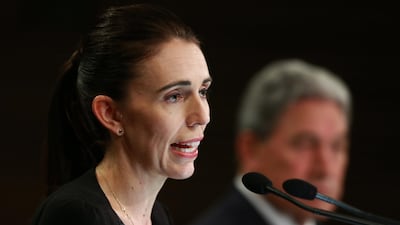New Zealand Prime Minister Jacinda Ardern said on Monday gun law reforms will be announced within 10 days following the Christchurch shootings that killed 50 people.
The country's police chief also said on Monday only one shooter was involved in the attack, but other people might have helped.
Ms Ardern said cabinet ministers had met and made an in-principle decision to tighten gun ownership but details still need to be worked out.
"I intend to give further details of these decisions to the media and the public before cabinet meets again next Monday," she said at a press conference.
"This ultimately means that within 10 days of this horrific act of terrorism we will have announced reforms which will, I believe, make our community safer."
The owner of a gun store in New Zealand said the man charged with murder bought the firearms and ammunition from his shop but said he did not sell the high powered weapons used in the attack.
New Zealand has approximately 1.5 million firearms. Under their law, the minimum age for a gun license is 16, and 18 to own a semi-automatic weapon.
A New Zealand standard A-category firearm licence – which permits the sale of semi-automatic weapons limited to seven rounds – is issued after a police and background check. No licence is required to buy a large round magazine, which can be illegally modified for use in such a weapon.
Only firearm owners are licensed, not weapons, so there is no monitoring of how many weapons a person may possess.
New Zealand's top online marketplace Trade Me Group said it was halting the sale of semi-automatic weapons in the wake of Friday's attack.
She did not give details on the new laws but said she supports a ban on semi-automatic weapons in the wake of the mosque shootings.
"The clear lesson from history around the world is that to make our community safer, the time to act is now," she said. "I strongly believe that the vast majority of gun owners in New Zealand will agree with the sentiment that change needs to occur."
Ms Ardern was also the first person to sign a national condolence book that she opened in the capital, Wellington.
"On behalf of all New Zealanders, we grieve together. We are one. They are us," she wrote.
The prime minister also announced an inquiry into the lead up to the attack and how the country's intelligence services might have prevented it.
The Australian suspected white supremacist charged in the massacre was not detected before his well-planned attack on two mosques and there have been concerns that intelligence agencies were overly focused on the Muslim community in detecting and preventing security risks.
At least 50 people were killed and dozens more wounded when a gunman opened fire in two mosques during Friday prayers in Christchurch.
As authorities attempt to react to the shooting, stories of heroism and sacrifice have emerged about those struck by the gunman's bullets.
An Iraqi man, who grew up in Abu Dhabi, ran towards the attacker to protect worshippers. Another man, an executive who splits his time between the UAE and New Zealand, was shot five times after he covered his children, to protect them from the bullets.
The gunman, who was arrested within an hour of opening fire, live-streamed the massacre on social media. It has now been made an offence to share the video, which Facebook said they had taken down 1.5 million times in the first 24 hours since the shooting.
Ms Ardern said on Sunday she wants to discuss live streaming with Facebook.
New Zealand's Police Commissioner Mike Bush also confirmed on Monday that there was only one gunman, but did not rule out other people supporting the attacker.

"I want to definitely state that we believe that there was only one attacker responsible for this horrendous event," Mr Bush said.
"That doesn't mean there weren't possibly other people in support, and that continues to form a very, very important part of our investigation," he added.
Mr Tarrant had declined to be represented by a lawyer but the court appointed duty lawyer Richard Peters to handle the case.
"He was lucid," Mr Peters told Australian TV network Channel Nine. He seemed to appreciate what he was facing and why he was there."

